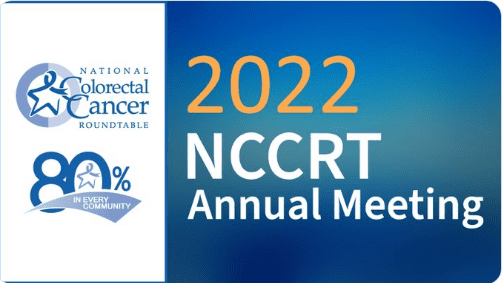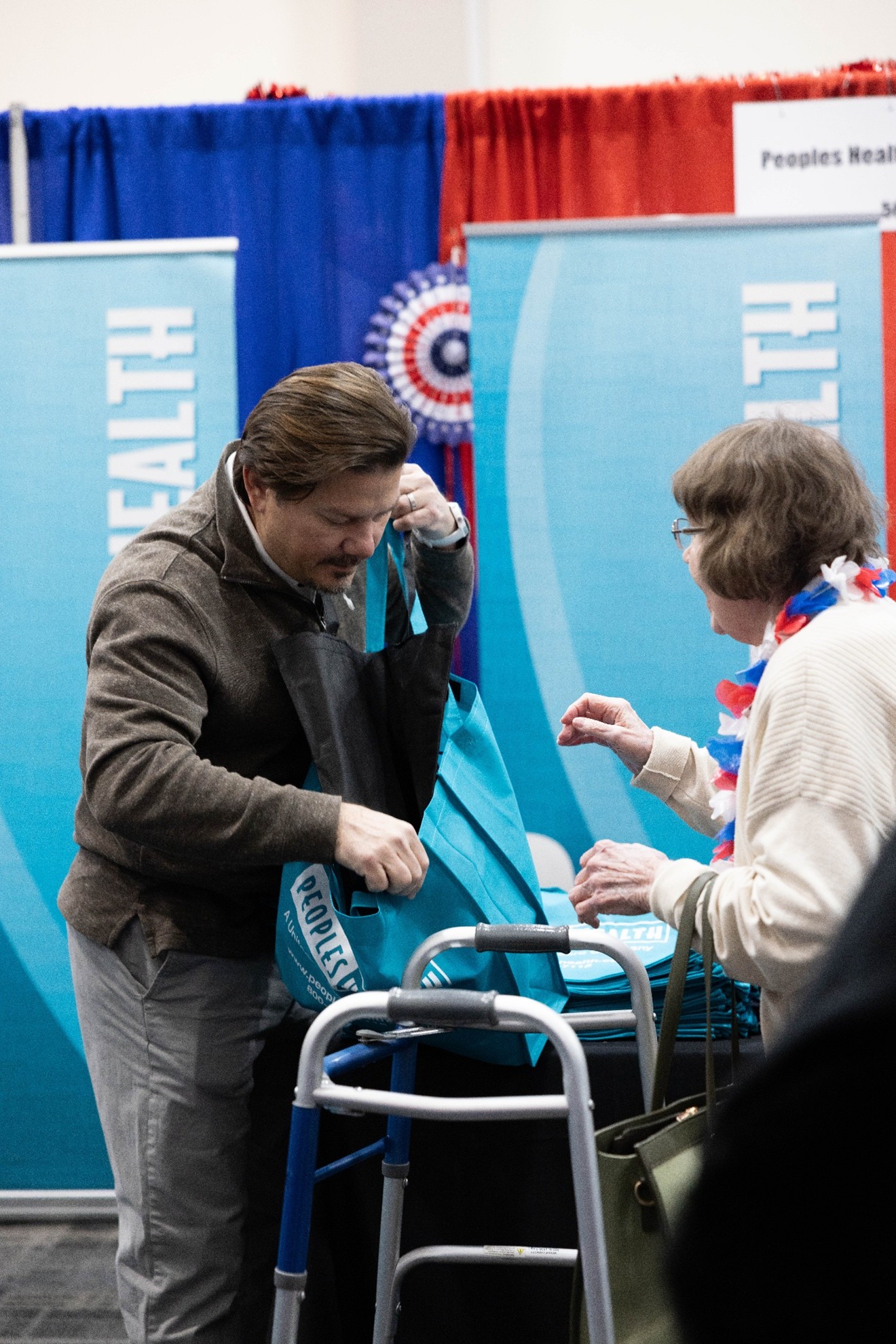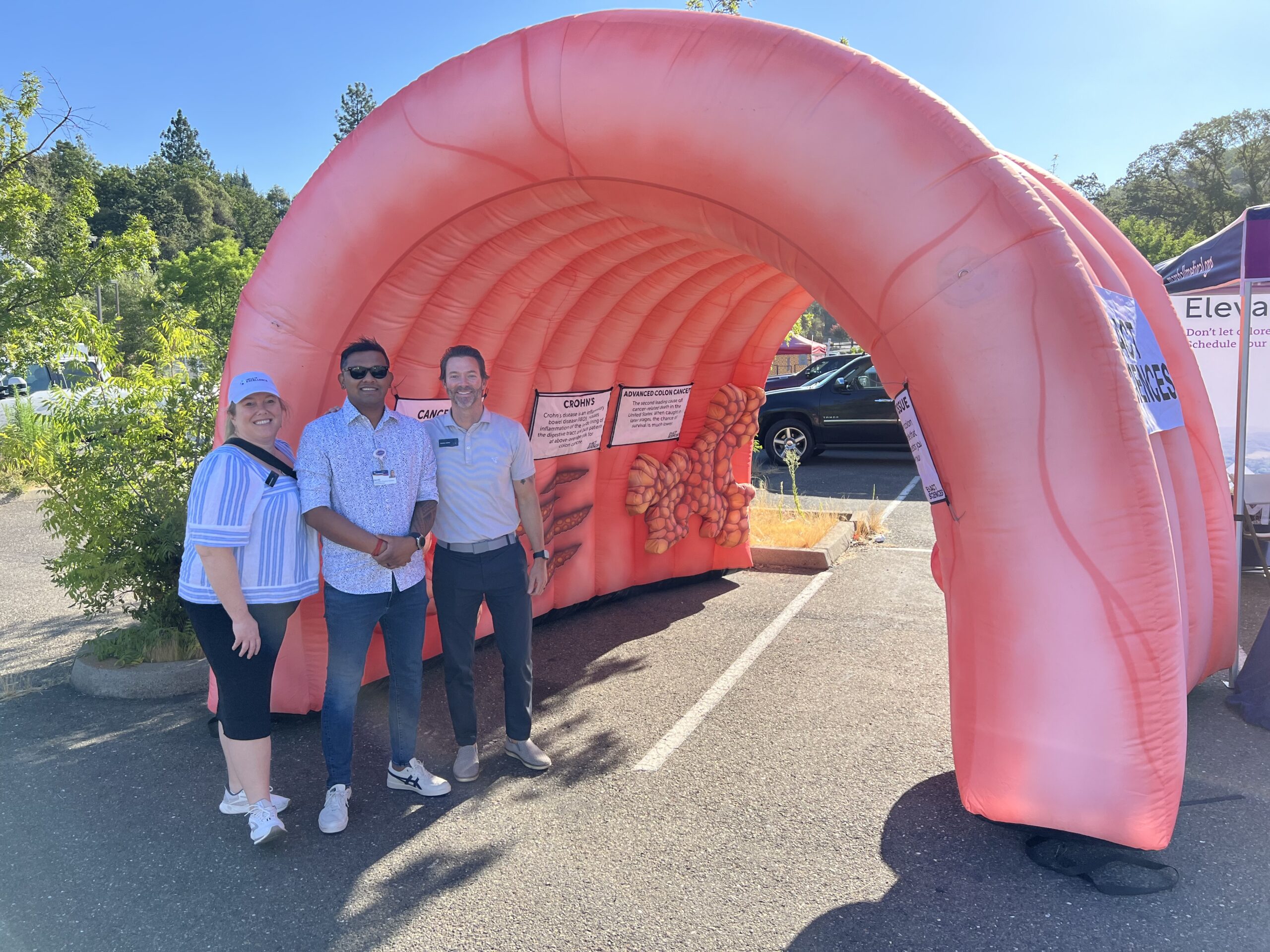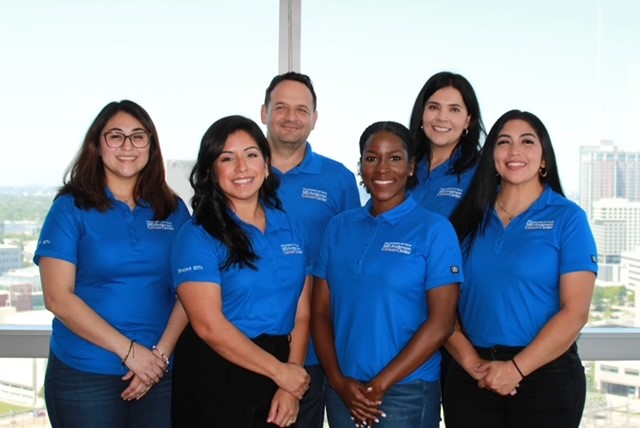CRC News: October 12, 2022

Dear NCCRT Members,
We have a couple updates to share with you today.
2022 NCCRT Annual Meeting Agenda Updates
We’re pleased to share we’ve confirmed several exciting updates to the agenda for our 2022 NCCRT Annual Meeting on November 16-18 in Baltimore, Maryland. Review a few topics below:
• Screening at 45: What We Know So Far
• Follow Up to Abnormal Non-Colonoscopy Testing: Moving from Policy to Implementation
• Implicit Bias in Health Care and the Impact on Survivorship
• Current and Future Colorectal Cancer Screening Strategies
• And many more timely sessions on colorectal cancer screening policy and delivery
If you haven’t already, be sure to register and reserve your hotel room by end of day October 19 to ensure you can book a room in our hotel block.
NCCRT members should have received their personalized registration link in a reminder email from the “The NCCRT Team” this morning (please check your spam/junk email if you are having trouble locating it). Please note: you must register using the same email address at which you received your registration invitation.
Download the agenda and learn about our generous 2022 meeting sponsors (it’s not too late to add your organization’s name to the list!) on our meeting webpage.
NCCRT Response to the NEJM Colonoscopy Study
NCCRT Members may have already seen the recent New England Journal of Medicine article, Effect of Colonoscopy Screening on Risks of Colorectal Cancer and Related Death, which is garnering a lot of attention in the national press and on social media. Below you will find a statement from our NCCRT co-chairs, Steven Itzkowitz, MD, FACP, FACG, AGAF, Professor of Medicine, Oncological Sciences and Medical Education, Icahn School of Medicine at Mount Sinai, and Robert Smith, PhD, Senior Vice President, Cancer Screening at the American Cancer Society.
On October 9, 2022, the New England Journal of Medicine published the first results of the Pragmatic NordICC Trial of Colonoscopy, which was conducted in Poland, Norway, Sweden, and the Netherlands to measure the efficacy of colonoscopy in reducing colorectal cancer incidence and mortality. The study evaluated the outcomes of 84,585 participants, with 28,220 in the invited group and 56,365 in the usual-care group, ie, they were not offered colorectal cancer screening. Screening took place from 2009 and 2014, and participants were followed up for a median of 10 years. When comparing the group invited to receive a colonoscopy with the group who received usual-care, the risk of colorectal cancer at 10 years was 0.98% in the invited group and 1.20% in the usual-care group, a statistically significant reduction in risk of developing colorectal cancer of 18%. However, the investigators only observed a 10% reduced risk of dying from colorectal cancer that was not statistically significant. When the analysis was restricted to individuals who were invited to screening and underwent screening (a per protocol analysis), the investigators observed statistically significant 31% reduction in the risk of developing colorectal cancer, and a statistically significant 50% reduction in the risk of dying from colorectal cancer. These differences are more in keeping with what we would expect based on prior research.
Is it possible that we’ve been wrong about the efficacy of colorectal cancer screening with colonoscopy? The answer is emphatically, No.
Randomized controlled trials (RCTs) are regarded as the gold standard for evaluating the efficacy of an intervention, which is why there are several ongoing RCTs for colonoscopy worldwide, including NordICC. In the meantime, the efficacy of colorectal cancer screening was established with RCTs of fecal occult blood testing. We have RCTs for flexible sigmoidoscopy that have shown statistically significant reductions in colorectal cancer mortality, and studies of CT colonography validated by colonoscopy. Based on indirect evidence, colonoscopy has been a recommended screening option in the US since the mid-1990s. So, the results of the NordICC are counterintuitive, and at this time are not definitive. Here are some possible explanations.
First, only 42% of the group that agreed to receive an invitation to have a colonoscopy actually adhered to the invitation, and it varied among the three participating countries from a high of 60% in Norway to a low of 33% in Poland. Second, the duration of follow-up is difficult to determine, but it is clear that if a study subject was screened in 2014, they could only have at most seven years of follow-up, which is too short. Keep in mind that the study findings include a significant 18% reduction in incidence and a 10% reduction in deaths, so it is reasonable to conclude that there has been too little follow-up and that more favorable results will be evident in the next 5-10 years. Third, we should want to learn more about the quality of the examinations, since an earlier study report showed that about a third of examiners did not meet metrics for adenoma detection rates. Fourth, if we examine the published supplemental material, Norway, which had two times the participation rate, had 24% lower incidence in the intention to treat analysis (everyone in the invited group whether they had a colonoscopy or not), and 45% lower incidence in the per protocol analysis (those who actually got a colonoscopy). The authors did not include mortality reductions by country in the main paper or the supplementary material, but a main driver of reduced colorectal cancer deaths is not ever developing colorectal cancer due to polypectomy during colonoscopy. This reduction in the disease-specific death rate will take longer to observe. Some of these points were raised in an editorial written by Drs. Jason Dominitz and Douglas Robertson published alongside the NordICC study.
In short, these early results do not cause us to question the value of colonoscopy. Rather, given the low uptake of colonoscopy in the study, we are reminded of the importance of offering all proven screening options to patients when recommending colorectal cancer screening including stool-based testing and CT colonography.
The NCCRT is committed to continuing our work to save more lives from colorectal cancer by increasing the use of proven colorectal cancer screening tests. With our 80% in Every Community campaign, we work in collaboration with our more than 180 members to substantially reduce colorectal cancer as a major public health problem in communities across the nation. Learn more about the NCCRT, 80% in Every Community, and the evidence-based resources available to support your work to increase colorectal cancer screening.
The American Cancer Society also shared a statement.
Call for NCCRT Steering Committee Nominations
We are currently seeking nominations for the NCCRT Steering Committee. The NCCRT Steering Committee provides strategic guidance to the NCCRT through participation in Steering Committee meetings, calls, and the NCCRT Annual Meeting. Steering Committee responsibilities include strategic planning, membership approval, oversight of NCCRT projects, and general leadership. The term of service is for two years beginning November 2022 and is renewable for one term. The names of nominees are submitted to the Nominating Committee, which reviews the nominations and selects the slate of Steering Committee candidates. The slate of candidates will be presented by email to the NCCRT membership prior to the Annual Meeting to be voted on at the Annual Meeting, which will be held November 16-18.
Self-nominations are accepted. Traditionally, the Nominating Committee has preferred candidates who have a history of engagement with the NCCRT. Representatives from our Corporate Associates may not serve on the Steering Committee, but they may nominate other candidates. Please note that nominees are not guaranteed a spot on the Steering Committee, as this can be a competitive process. Having said that, we are grateful to all individuals who are willing to put themselves forward as nominees. Serving on the Steering Committee is a big commitment, and Steering Committee members play a vital role in the work of the NCCRT.
If you are interested in submitting your name to the Nominating Committee for consideration or would like to nominate someone, please email Emily Butler Bell at [email protected] by end of day Friday, October 21st. Nominees are asked to submit a Statement of Interest (1,000 word maximum) along with a CV by this deadline.
Many thanks for the great work you do!
The NCCRT Team


